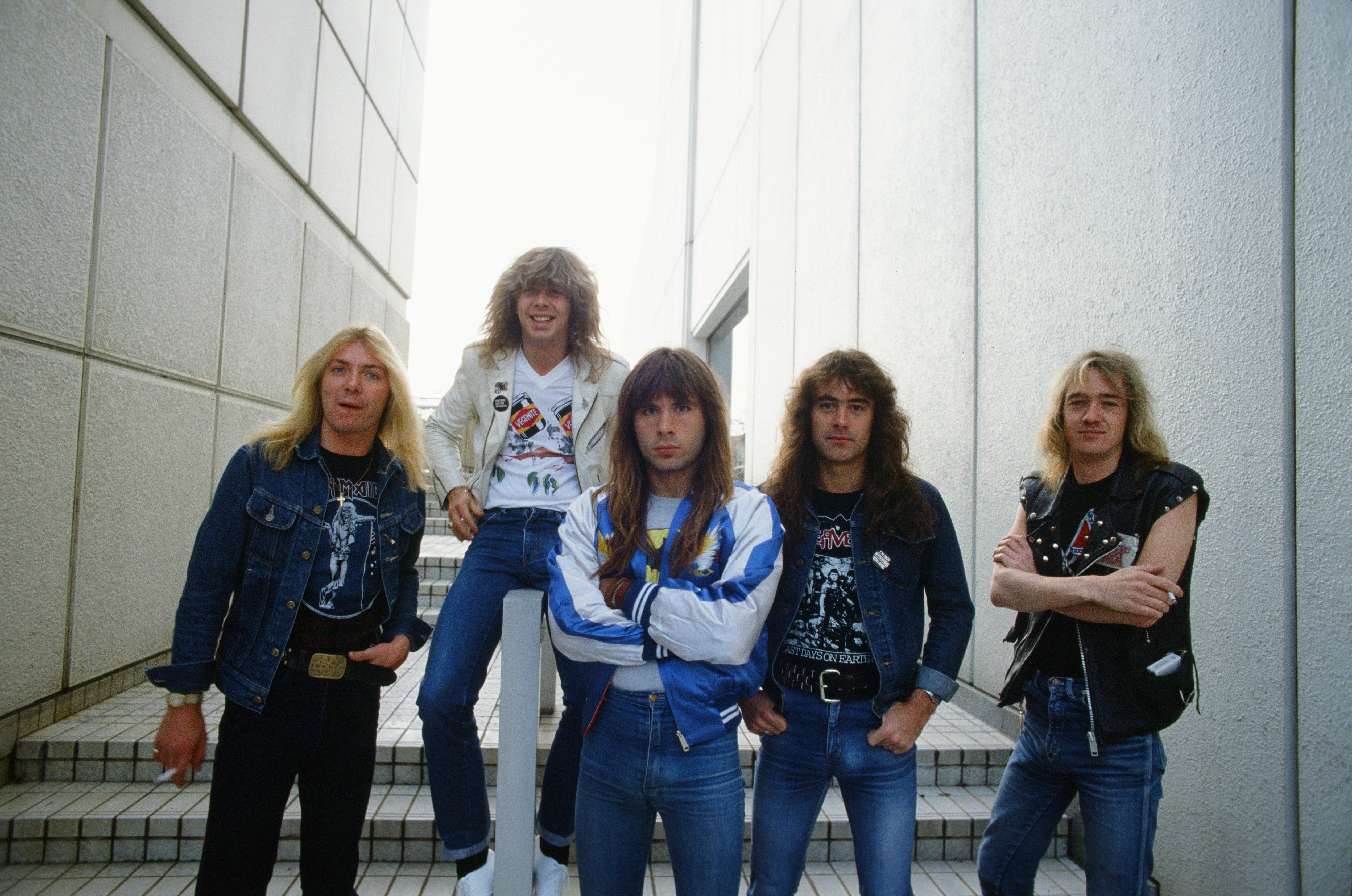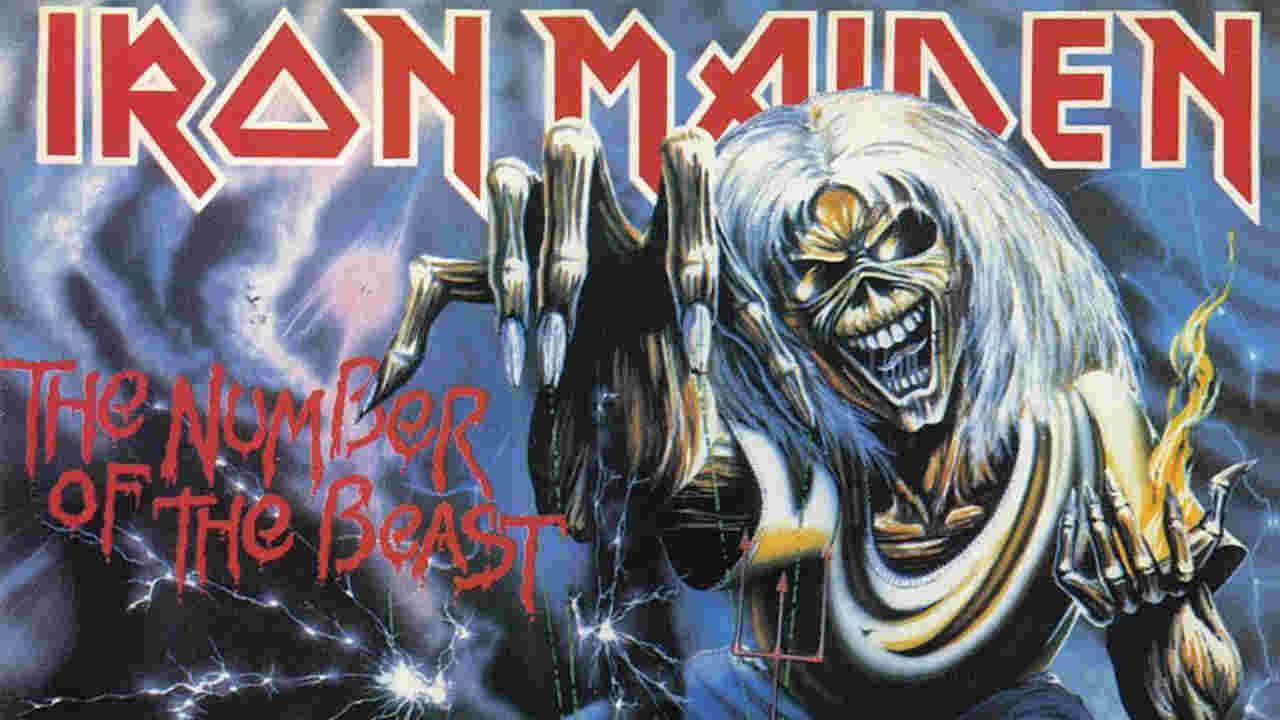It was no coincidence that the B-side of Iron Maiden’s debut single (Running Free, released February 1980) was entitled Burning Ambition. In contrast to the majority of the bands that fuelled the nascent New Wave Of British Heavy Metal 40 years ago, Steve Harris’s crew had the vision, focus, commitment and discipline of a band with nothing less than world domination on their minds.
After years of tireless gigging, the Londoners’ first two albums – Iron Maiden (1980) and Killers (1981) – had thrust them firmly into the spotlight - with unforgettable, iconic, Eddie-centric artwork providing another layer of intrigue. Unfortunately, the best-laid plans almost always turn to shit, and by the time Maiden were reaching the end of their US tour in support of Killers, it had become abundantly apparent that talismanic frontman Paul Di’Anno was rather more interested in getting wasted on cocaine and booze than he was in delivering the high-quality performances that the band had made their trademark.
Immediately after the tour, Paul was sacked, and one of the hottest rock bands on the planet suddenly found themselves – with the recording of that all-important third album looming - in urgent need of a worthy replacement. As you may be aware, they found one. After a meeting with Maiden manager Rod Smallwood backstage at the Reading Festival in August 1981, soon to be ex-Samson vocalist Bruce Dickinson was summoned for an audition a few weeks later and, not surprisingly given the fucking pipes on the man, was immediately hired.
Now armed with a new secret weapon and still surfing on waves of hard-earned momentum, Iron Maiden hit Battery Studio in London with producer Martin Birch to record the album that would change everything: The Number Of The Beast. From its epoch-shattering cover art to its near-universally cherished musical contents, Iron Maiden’s third album is simply one of the definitive heavy metal records from the genre’s formative years.
Prior to its release back in February 1982, Maiden released a single, Run To The Hills, which introduced Bruce Dickinson’s incredible voice to the world. Accompanied by a ludicrous but great, Wild West-themed video, the single quite rightly rocketed into the UK Top 10.
An instant anthem, Run To The Hills confirmed that Iron Maiden had done more than negotiate a major line-up change: they were a band reborn, and with more swagger and confidence than ever. A month later, The Number Of The Beast was released in its full glory and shot immediately to #1 in the UK album chart.

Meanwhile, over in Los Angeles, a young Brian Slagel (a lifelong Iron Maiden fanatic and the owner of Metal Blade Records) was officially the happiest men on the planet. “For me, Maiden were already my favourite band, so when they changed singers it was interesting, like ‘Ooh, what is this gonna be like?’” Brian recalls to Hammer.
“But knowing Samson already, I thought Bruce would do really well, and then I got the record. From the first listen I was just blown away. The Number Of The Beast, to me, still to this day, is the perfect heavy metal album. Everything is perfect. The sound is perfect, the songs are perfect, the lyrics are perfect. It’s the ultimate heavy metal album and it checks off all the boxes. I probably listened to it incessantly, over and over and over again, for at least a couple of weeks. I became completely obsessed with it.”
While conquering the UK was already on the cards, The Number Of The Beast was the record that ensured that Iron Maiden would be an unstoppable force everywhere else too, and particularly in the US. Thanks in part to the ferocious brilliance of songs like Children Of The Damned and 22 Acacia Avenue, but also to the self-evident fact that Bruce Dickinson was a force to be reckoned with, The Number Of The Beast exuded exactly the kind of ambition that the fledgling heavy metal scene needed to push things forward.
Having already toured extensively in America, Maiden had paved the way for bigger and better things, but The Number Of The Beast sped the process up considerably.“When the success came, it came really fast,” says Brian Slagel. “It was interesting. I went to see them in 1981 when they opened for Judas Priest. I flew to Houston to see them, the first time I saw them, and nobody really knew who they were.
There was definitely an underground buzz and the metal scene in the US was starting to happen. Metallica were doing the underground circuit by that point. But when The Number Of The Beast came out, it did well at the start and then I remember it accelerated so fast. By the time they came back and did the tour for that album, they were already headlining some arenas.”
It’s hard to overstate the impact The Number Of The Beast has had on generations of metal fans and musicians. Defining their sound across eight songs and 40 minutes of peerless bombast, Iron Maiden’s third album arrived at the perfect time: when heavy metal was gaining traction as a genre and needed new standard bearers to spread the gospel around the world.
In aesthetic terms, The Number Of The Beast also looked cooler, gnarlier and more exciting than anything else on record shop shelves back in 1982. If seeing the video for Run To The Hills on Top Of The Pops had failed to convince you, Derek Riggs’ magnificent artwork was sure to seal the deal.
Hysterical religious folk in America did not react quite so well, decrying Iron Maiden as Satanists and even burning piles of LPs in protest at the album’s supposed occult content. But those people were silly and probably did Maiden a favour by generating some extra publicity. So well done.

Forty years on, the influence of The Number Of The Beast can be heard in a vast array of contemporary heaviness, and it might be quicker to list notable metal musicians who don’t cite the record as an inspiration.
A band with a subtle but unmistakable debt to Iron Maiden, both musically and visually, Cradle Of Filth confirmed their endorsement of the band with a cover of Hallowed Be Thy Name back in 1998. As Dani Filth explains, The Number Of The Beast was an essential part of any 80s metal kid’s collection.
“Back in the day, I’d go to Woolworths and they’d have a load of cheap albums, and for some reason they had Killers, The Number Of The Beast and Piece Of Mind, all at £3.49, so my dad got me one at a time!” Dani laughs.
“I think The Number Of The Beast was one of the first I got. It was a massive game-changer. In some ways it was quite contentious. They moved away from their origins in a way, because the first two records had that punky edge, mainly thanks to Paul Di’Anno. But it was Bruce’s first album, and what a way to introduce yourself… [passable Bruce falsetto] ‘Invaaaaders!’ Ha ha ha! Fucking hell. I wonder what people thought when they heard that first song. Bruce’s wail was something else. And then there’s Hallowed Be Thy Name, which is obviously the best song on the record.”
Frequently cited as one of the greatest heavy metal songs ever written, The Number Of The Beast’s epic closing track is an undeniable cornerstone of heavy metal’s internal architecture. Alongside Cradle Of Filth’s venomous rendition, everyone from heavyweights Machine Head and Dream Theater to doom legends Solitude Aeturnus and US metalcore berks Escape The Fate have covered the song.
“It’s just such a blinder to play,” grins Dani. “There’s so much space for the vocalist. It’s really melodic. It’s got a really great storyline, about a condemned man facing the gallows. It really builds up. It’s tragic, too - the perfect ending to a record. They couldn’t have ended the album with anything else.”
"Hallowed Be Thy Name is the greatest song ever written, according to me!” declares Brian Slagel. “Everything about it is perfect. The lyrical content is really cool – you really feel like you’re that guy, waiting to be hanged. You get his feelings, his emotions.
The singing is great. The leads are incredible. Adrian [Smith] and Dave [Murray] are really the two most underrated guitarists ever. They don’t get the credit they deserve at all. But yeah, it’s literally the perfect heavy metal song. There’s not one thing I would change. I still get goosebumps every time I listen to it.”
After the release of The Number Of The Beast, Iron Maiden spent the rest of the 80s being generally all-conquering and unstoppable. Somehow, they even managed to negotiate the 90s, even as old-school metal was in a state of commercial fragility.
The influence of The Number Of The Beast and the classic Maiden sound it cast in stone would not be denied, and the 21st century saw a huge resurgence in popularity for both the band themselves and the heavy metal template they threw down in 1982.
From contemporary classicists like Arch Enemy, Trivium and Amon Amarth to the entire metalcore scene, Maiden’s musical fingerprints are plastered all over today’s heavy music world. “Oh, big time, their influence is absolutely huge,” says Employed To Serve’s Sammy Urwin.
“Maiden are a funny one. They’re the one that seems to stick out for people, especially in the hardcore scene. Everyone is into Sabbath and Priest, but Maiden can be the Marmite one of the three. But they’ve influenced so much metalcore. Everyone from Prayer For Cleansing, Unearth and Darkest Hour – the influence of records like The Number Of The Beast on bands like that is undeniable. I went even further down the Maiden rabbit hole and became a little bit obsessed, I think.”
Not just influential on a musical level, The Number Of The Beast is as much a part of heavy music culture as it is a straightforward, mandatory soundtrack for diehard metalheads. In fact, the album has transcended its heavy metal origins and passed into the broader mainstream consciousness, as Sammy explains:
“Being from that metalcore generation, the Tony Hawk games were so influential on my musical taste, as ridiculous as it sounds. The Number Of The Beast was on Tony Hawk’s Pro Skater 4 and I’d be playing that all the time, so that song is just ingrained into my head.
I’ve got a special relationship with it. When you’re younger, you get things coming at you like Slipknot and Limp Bizkit, and it’s all flashy and exciting, but as your taste grows and you get into more progressive stuff, there’s so much more to unlock with records like The Number Of The Beast. Maiden are the gift that keeps on giving.”
Aside from making some of us feel very fucking old, the 40th anniversary of The Number Of The Beast is clearly one worth celebrating. The moment when one of the greatest bands of all time truly hit their stride and morphed into the unassailable heroes we know today, it was the perfect album at the perfect time, by the perfect heavy metal band.
“For me it came along at a time when I was really heavily getting into the whole metal thing,” Brian Slagel concludes. “I was starting my record company and it was a pivotal point in my life, and which determined what I would do for the rest of it! Maiden motivated me to do whatever I could to make other people hear this amazing music. If The Number Of The Beast could touch me so much, everybody else needed to hear it. It was the greatest thing I’ve ever heard. It was a life-changing experience.”


